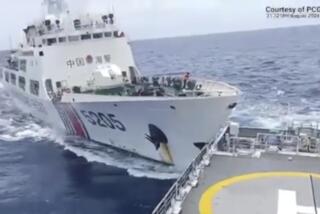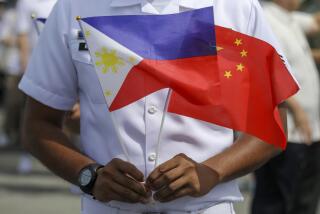Taiwan says Filipino apology in fisherman’s death not enough
- Share via
TAIPEI, Taiwan — The killing of a Taiwanese fisherman by the Philippines’ coast guard has spiraled into a series of sanctions and sparked a rare anger-fest threatening the normally solid Pacific Rim alliance.
The dispute has not eased despite Philippine President Benigno Aquino III’s formal apology Wednesday for the death of the 65-year-old fisherman, a statement that came after two deadlines set by Taiwan to say sorry or suffer consequences had passed.
Taiwanese Premier Jiang Yi-huah called the apology insincere because it didn’t cast the incident in overlapping ocean economic zones of the Luzon Strait as an intentional act.
Philippine authorities admitted last week that one of their coast guard ships opened fire May 9 on the Taiwanese fisherman’s vessel, but said they had done so to prevent their own ship from being rammed and only intended to disable the engine.
Taipei recalled its ambassador, froze new applications for Filipinos seeking work in Taiwan and told 88,000 migrant workers from its neighbor that their existing contracts were at risk of not being renewed. It also cut off economic, transit and fishing cooperation dialogue.
The unusual spat between two normally friendly neighbors who are just 160 miles apart could weaken one link in an alliance of U.S. Pacific Rim allies that also includes South Korea and Japan. Some call the alliance a buffer against China’s rise as a military power.
The Philippines was also Taiwan’s 12th largest trade partner last year, with two-way trade of about $11 billion.
Taiwan, being diplomatically isolated by its economically more powerful rival China, seldom picks fights with other nations. But President Ma Ying-jeou, faced with a 13% approval rating in a January opinion survey, has tried to toughen up his foreign policy amid criticism that Taiwan is being forgotten amid China’s rise.
Aquino’s party coalition had just weathered midterm legislative elections, so the Filipino president was hardly expected to give Taiwan quite the apology it wanted at the risk of looking weak.
A blow-up was all but inevitable, said Raymond Wu, managing director with E-telligence, a political risk consultancy in Taipei.
“This [kind of event] hasn’t happened in Taiwan with any regularity, so this is going to stay around for some time,” Wu says. “It’s not going to become quickly yesterday’s news.”
Taiwanese, fueled by television and Internet commentary, can be overheard in public venting anger toward the Philippines and saying their president’s hard line is fair.
Filipinos stung by the migrant labor freeze have sounded off on Internet forums, calling Taiwan “fake” and “a joke” for its move.
Taiwan’s own high-tech industry may lose out because firms often tap college-trained, English-literate Filipinos as a cheap labor source.
“It’s going to have an effect on the business community here,” said Peter O’Neill, coordinator for migrant services with the Roman Catholic diocese in Taiwan’s Hsinchu county. “And it’s going to affect Filipinos because when they finish contracts they’ll have no jobs at home.”
ALSO:
Chinese military unit said to resume cyber spying
12 killed as suicide car bomber hits NATO convoy in Kabul
Global Voices: Palestinian quest for statehood a moving target
More to Read
Sign up for Essential California
The most important California stories and recommendations in your inbox every morning.
You may occasionally receive promotional content from the Los Angeles Times.










